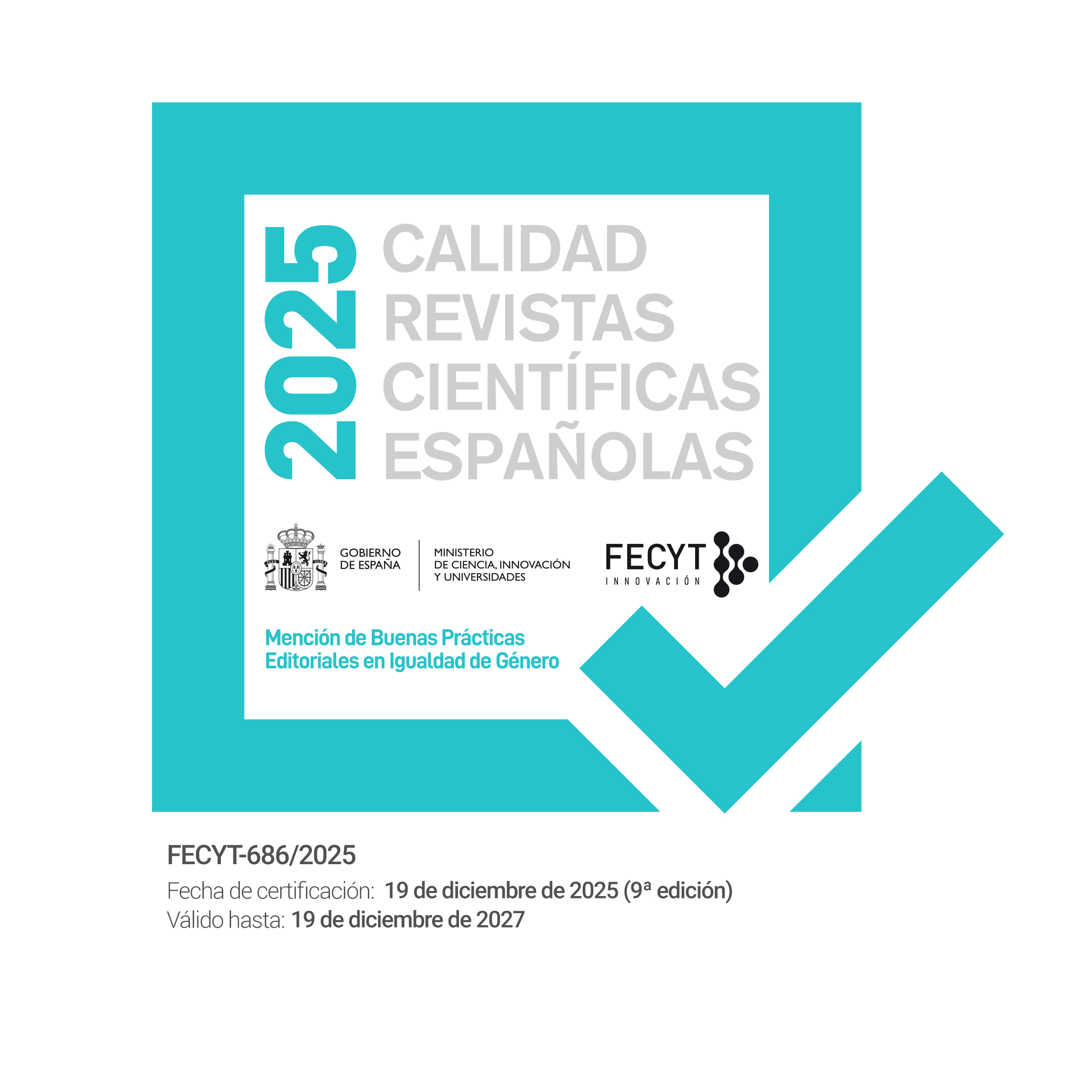Parentalidad positiva
Rivas Borrell, S. y Beltramo, C. (Coords.). (2022). Parentalidad Positiva. Una mirada a una nueva época. Madrid: Editorial Pirámide.
DOI:
https://doi.org/10.55414/ap.v40i3.1515Keywords:
.Downloads
References
Inmaculada Gómez Becerra (Universidad de Almería, España)
Rivas Borrell, S. y Beltramo, C. (Coords.). (2022). Parentalidad Positiva. Una mirada a una nueva época. Madrid: Editorial Pirámide.
Referencias
Alonso García, J. y Román Sánchez, J.M. (2005). Prácticas educativas familiares y autoestima. Psicothema, 17(1), 76-82.
APA (2021). Family Therapy. APA Dictionary of Psychology (https://dictionary.apa.org/).
Aunola, K. y Nurmi, J.E. (2005). The Role of Parenting Styles in Children's Problem Behavior. Child Development, 76(6), 1144-1159 [DOI: 10.1111/j.1467-8624.2005.00841.x].
Álvarez-Blanco, I., García Díaz, V. y Tuero, E. (2020). Necesidades socioeducativas de las familias ante el abandono escolar prematuro. INFAD International Journal of Developmental and Educational Psychology, 1(1), 321-330 [DOI: 10.17060/ijodaep.2020.n1.v1.1788].
Comisión Europea (2013). Recomendación 112 de la Comisión Europea, de 20 de febrero de 2013 - Invertir en la infancia: romper el ciclo de las desventajas. Diario Oficial de la Unión Europea, L 59, 5-16.
Consejo de Europa (2006). Recomendación Rec 19 del Comité de Ministros a los Estados Miembros sobre Políticas de apoyo al ejercicio positivo de la parentalidad. Informe explicativo [Recuperado de: https://search.coe.int/cm/Pages/result_details.aspx?ObjectId=09000016805d6dda].
Crockenberg, S.C., Leerkes, E.M. y Lekka, S.K. (2007). Pathways from marital aggression to infant emotion regulation: The development of withdrawal in infancy. Infant Behavior and Development, 30(1), 97-113 [DOI: 10.1016/j.infbeh.2006.11.009].
Del Barrio Gándara, M.V. y Carrasco Ortiz, M.A. (2002). Trastornos emocionales: depresión y retraimiento social. En M. Servera Barceló (Coord.), Intervención en los trastornos del comportamiento infantil. Una perspectiva conductual de sistemas (pp. 179-215). Madrid: Pirámide.
Eisenberg, N. y Valiente, C. (2002). Parenting and Children ́s Prosocial and Moral Development. En M.H. Bornstein (Ed.), Handbook of Parenting. Vol. 5. Practical Issues in Parenting (pp. 111-142). Mahwah, New Jersey: Lawrence Erlbaum Associates.
Epstein, J.L. y Sanders, M.G. (2002). Family, School and Community Patnerships. En M.H. Bornstein (Ed.), Handbook of Parenting. Vol. 5. Practical Issues in Parenting (pp. 407-437). Mahwah, New Jersey: Lawrence Erlbaum Associates.
Flujas Contreras, J.M. (2021). Efectividad de una intervención en flexibilidad psicológica parental y regulación emocional a través de internet. Tesis Doctoral. Almería: Universidad de Almería.
Fondo de las Naciones Unidas para los Niños (2021) Informe Estado mundial de la Infancia 2021. En mi mente. Promover, proteger y cuidar la salud mental de la infancia. Nueva York: UNICEF.
Furlong, M., McGilloway, S., Bywater, T., Hutchings, J., Smith, S. y Donnelly, M. (2012). Behavioural and cognitive-behavioural group-based parenting programmes for early-onset conduct problems in children aged 3 to 12 years. Cochrane Database of Systematic Reviews, 2012(2), CD008225 [DOI: 10.1002/14651858.CD008225.pub2].
Gilliom, M. y Shaw, D.S. (2004). Codevelopment of externalizing and internalizing problems in early childhood. Development and Psychopathology, 16(2), 313-333 [DOI: 10.1017/s0954579404044530].
Gobierno de España (2015) Plan Integral de Apoyo a la Familia 2015-2017.
Gómez, I., García-Barranco, R., Hodar, J.C. y Martínez, M.M. (2012). Intervención en valores con familias de riesgo social desde la Terapia de Aceptación y Compromiso. Análisis y Modificación de Conducta, 38(157-158), 39-58.
Husky, M.M., Boyd, A., Bitfoi, A., Carta, M.G., Chan-Chee, C., Goelitz, D., Koç, C., Lesinskiene, S., Mihova, Z., Otten, R., Pez, O., Shojaei, T. y Kovess-Masfety, V. (2018). Self-reported mental health in children ages 6–12 years across eight European countries. European Child & Adolescent Psychiatry, 27, 785-795 [DOI: 10.1007/s00787-017-1073-0].
Lafrance Robinson, A., Dolhanty, J., Stillar, A., Henderson, K. y Mayman, S. (2016). Emotion-Focused Family Therapy for Eating Disorders Across the Lifespan: A Pilot Study of a 2-Day Transdiagnostic Intervention for Parents. Clinical Psychology and Psychotherapy, 23(1), 14-23 [DOI: 10.1002/cpp.1933].
Maliken, A.C. y Katz, L.F. (2013). Exploring the Impact of Parental Psychopathology and Emotion Regulation on Evidence-Based Parenting Interventions: A Transdiagnostic Approach to Improving Treatment Effectiveness. Clinical Child and Family Psychology Review, 16(2), 173-186 [DOI: 10.1007/s10567-013-0132-4].
Ministerio de Sanidad, Consumo y Bienestar Social (2017). Encuesta Nacional de Salud de España 2017 - ENSE 2017. Metodología.
Ministerio de Sanidad, Servicios Sociales e Igualdad (2013). II Plan Estratégico Nacional de Infancia y Adolescencia 2013-2016. Madrid: Centro de Publicaciones del Ministerio de Sanidad, Servicios Sociales e Igualdad.
Moreno García, I. y Revuelta Pérez, F. (2002). El trastorno por negativismo desafiante. En M. Servera Barceló (Coord.), Intervención en los trastornos del comportamiento infantil. Una perspectiva conductual de sistemas (pp. 255-276). Madrid: Pirámide.
Mulsow, G.N. (2008). Desarrollo emocional: impacto en el desarrollo humano. Educação, 31(1), 61-65.
Nelson, D.A. y Coyne, S.M. (2009). Children’s Intent Attributions and Feelings of Distress: Associations with Maternal and Paternal Parenting Practices. Journal of Abnormal Child Psychology, 37(2), 223-237 [DOI: 10.1007/s10802-008-9271-3].
Polanczyk, G.V., Salum, G.A., Sugaya, L.S., Caye A., y Rohde, L.A. (2015). Annual Research Review: A meta-analysis of the worldwide prevalence of mental disorders in children and adolescents. Journal of Child Psychology and Psychiatry, 56(3), 345-365 [DOI: 10.1111/jcpp.12381].
Rekart, K.N., Mineka, S., Zinbarg, R.E. y Griffith, J.W. (2007). Perceived Family Environment and Symptoms of Emotional Disorders: The Role of Perceived Control, Attributional Style, and Attachment. Cognition Therapy Research, 31(4), 419-436 [DOI: 10.1007/s10608-007-9131-4].
Robles Pacho, Z. y Romero Triñanes, E. (2011). Programas de entrenamiento para padres de niños con problemas de conducta: una revisión de su eficacia. Anales de Psicología, 27(1), 86-101.
Sandín, B., Chorot, P. y Valiente, R.M. (2018). Trastornos de ansiedad en niños y adolescentes. En J.C. Arango Lasprilla, I. Romero García, N. Hewitt Ramírez y W. Rodríguez Irizarry (Eds.), Trastornos psicológicos y neuropsicológicos en la infancia y la adolescencia (pp. 180-234). México: Manual Moderno.
Downloads
Published
Issue
Section
License
Copyright (c) 2022 APUNTES DE PSICOLOGÍA

This work is licensed under a Creative Commons Attribution-NonCommercial-NoDerivatives 4.0 International License.



























